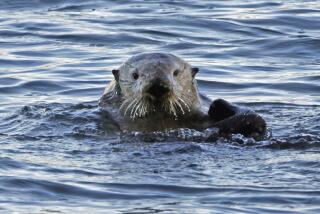Parasite Forces Changes in Oystermen’s Way of Life
SHELLPILE, N.J. — The air is pungent with the smell of the sea, and sea gulls busily pick through piles of crushed oyster and clam shells. But the pervading mood is mournful because the oysters are dying out.
Since the late 1950s, oysters in the Delaware and Chesapeake bays have been plagued by a parasite known as MSX--”multinucleated sphere, unknown.”
Off southern New Jersey, the problem has become so bad that oyster fishing has been almost entirely eliminated for the past two years. People who make their living from the shellfish are hoping that a parasite-resistant strain of oysters can be introduced, but meanwhile, packing houses have had to modify their operations to survive.
At Robbins Bros. Oysters, for instance, newly painted signs announce that “fresh seafood” is the main business.
Gone to Casinos
“We have 25 people working here now, but at one time we had about 100,” said co-owner George McConnell, who fished for oysters for 20 years. “Many have gone to work for the sand plant down the road, some local factories or gone to Atlantic City to work in the casinos.”
Down the road in Port Norris, the Peterson Packing Co. now shucks and processes oysters trucked in from Connecticut, where the disease has not had an effect.
“It’s a harsh reality--there has been no oyster harvest last year or this year,” said manager Harold Bickings, a former oysterman. “The last time we went to check on seed oysters in Delaware Bay, they virtually had all died.
“There aren’t any New Jersey oysters around here. They can’t be called a thing of the past, but they are definitely not a thing of the present.”
Oystermen in these small bay towns are holding out hope that Rutgers University researchers, stationed in nearby Bivalve, will find a solution.
“We have a great amount of expectations that they can produce immune oysters,” Bickings said.
John Kraeuter, associate director of the Rutgers Shellfish Research Laboratory, said: “We’re making pretty good headway on such an oyster, but it’s not going to revive the industry within the year.”
More to Read
Sign up for Essential California
The most important California stories and recommendations in your inbox every morning.
You may occasionally receive promotional content from the Los Angeles Times.










